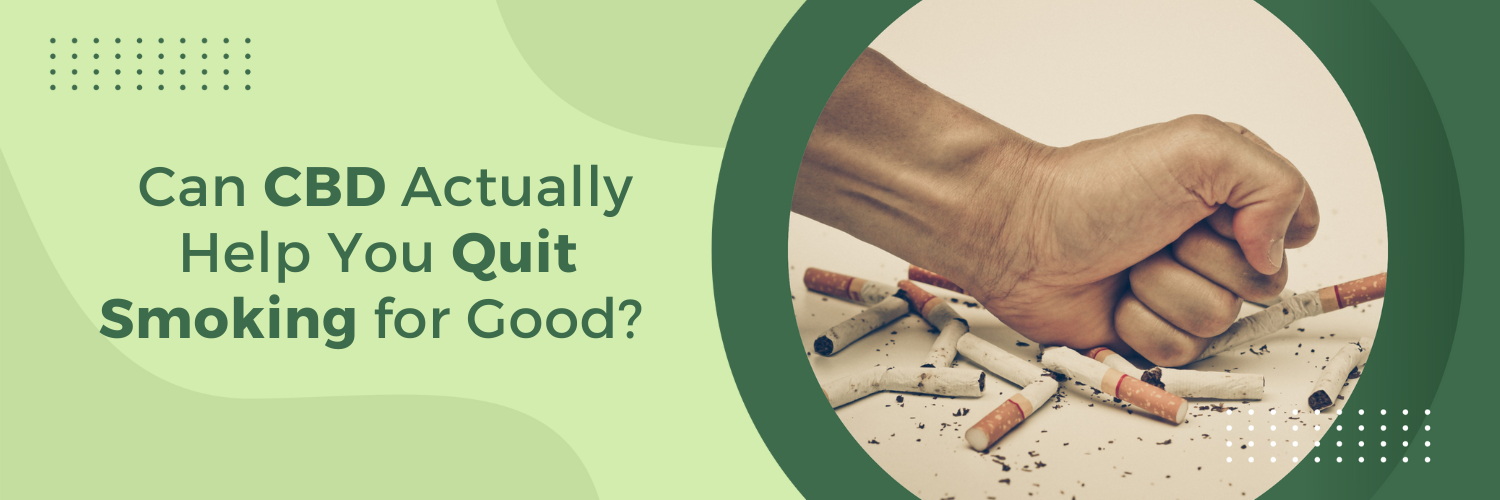Smoking Cessation
Smoking cessation is a complex journey that often requires multifaceted approaches. One emerging avenue of interest is the potential use of cannabidiol (CBD) to aid in quitting smoking. CBD, short for cannabidiol, is a naturally occurring compound found in the cannabis plant. It is one of over a hundred cannabinoids identified in cannabis and is distinct from tetrahydrocannabinol (THC), the cannabinoid responsible for the psychoactive effects associated with marijuana. CBD has garnered attention for its potential therapeutic properties, ranging from pain relief to anxiety reduction. This raises the question: Can CBD indeed help individuals overcome nicotine addiction and quit smoking for good?
Legal Status and Safety of CBD
The legal status of CBD varies by country and region. In many places, CBD derived from hemp is legal as long as it contains negligible levels of THC. This legal distinction has fueled the growth of the CBD industry, leading to a wide array of products available, including oils, tinctures, capsules, edibles, topicals, and more. Generally considered safe, CBD is associated with minimal side effects, primarily including dry mouth, changes in appetite, and potential interactions with other medications. However, its safety profile can be influenced by factors such as dosage and individual sensitivity.
The Role of Nicotine in the Brain
To comprehend how CBD could potentially aid in smoking cessation, it’s important to grasp the mechanics of nicotine addiction. Nicotine, the primary psychoactive substance in tobacco, exerts its addictive effects by binding to nicotine receptors in the brain, triggering the release of dopamine—the “feel-good” neurotransmitter. Over time, the brain becomes reliant on nicotine to maintain a certain level of dopamine, leading to addiction. Breaking this cycle involves addressing both the physical and psychological aspects of addiction.
The Emotional and Physical Triggers for Smoking
Smoking often becomes intertwined with daily routines and emotional triggers. Stress, boredom, social situations, and habitual cues all contribute to the urge to smoke. Nicotine’s effects on mood regulation further solidify its hold. Therefore, an effective smoking cessation strategy must address these triggers and provide alternative coping mechanisms.
Health Impacts of Chronic Smoking
The detrimental health effects of smoking are well-documented. Smoking is a leading cause of preventable diseases, including lung cancer, heart disease, and respiratory disorders. Understanding the gravity of these health risks can serve as a powerful motivator for individuals seeking to quit smoking.
How CBD Can Potentially Aid in Smoking Cessation
The Endocannabinoid System’s Role in Addiction
The endocannabinoid system (ECS) plays a role in regulating reward, mood, and stress responses, making it relevant to addiction. CBD interacts with the ECS, potentially influencing these aspects and modulating addictive behaviors. By targeting the ECS, CBD could contribute to the rewiring of neural circuits associated with addiction.
CBD’s Impact on Cravings and Withdrawal Symptoms
One of the challenges of quitting smoking is dealing with cravings and withdrawal symptoms such as irritability, anxiety, and sleep disturbances. CBD’s potential anti-anxiety and stress-reducing properties may mitigate these symptoms, making the quit journey more manageable.
Reducing Anxiety and Stress: CBD’s Calming Effects
CBD’s anxiolytic effects have been a subject of interest in both clinical and anecdotal contexts. Research suggests that CBD can interact with serotonin receptors and regulate cortisol levels, potentially reducing anxiety and stress. Since these emotional states often trigger smoking, CBD’s calming effects could help individuals avoid the urge to smoke.
Key Studies on CBD and Smoking Cessation
Scientific exploration into CBD’s role in smoking cessation is relatively new but promising. Studies on animals and humans have provided insights into how CBD might impact addiction-related behaviors. For instance, a study published in the journal Addictive Behaviors reported that smokers who used CBD inhalers reduced cigarette consumption compared to those who used placebo inhalers.
Limitations and Concerns in Current Research
While early studies are encouraging, it’s important to acknowledge their limitations. The number of clinical trials is relatively small, and more comprehensive research is needed to establish CBD’s efficacy and safety for smoking cessation. Dosage, timing, and individual variations also contribute to the complexity of interpreting study results.
Anecdotal Evidence and Personal Testimonies
Many individuals have shared personal success stories of using CBD as part of their smoking cessation strategy. These anecdotes highlight the potential value of CBD in addressing both the physical and psychological aspects of quitting smoking. However, individual experiences can vary widely, and personal testimonies should be considered alongside scientific evidence.
Different Methods of CBD Consumption for Quitters
CBD products come in various forms, including oils, tinctures, vapes, gummies, and more. The choice of consumption method can impact the speed and intensity of CBD’s effects. For example, vaping or sublingual consumption results in faster absorption compared to edibles. Selecting the right form depends on individual preferences and desired outcomes.
Incorporating Behavioral Techniques Alongside CBD Use
While CBD shows promise, it’s essential to integrate it into a comprehensive smoking cessation strategy. Behavioral techniques, such as identifying triggers and developing coping strategies, are crucial for long-term success. Combining CBD with counseling, support groups, or cognitive-behavioral therapy can enhance the overall effectiveness of the quit plan.
Consultation with Healthcare Professionals: A Recommended Step
Individuals considering CBD for smoking cessation should consult healthcare professionals before making any changes to their treatment plans. Medical experts can provide personalized guidance, evaluate potential interactions with existing medications, and help individuals navigate the nuances of CBD usage.
Potential Side Effects and Concerns
CBD is generally well-tolerated, but like any substance, it can lead to side effects in some individuals. Common side effects include dry mouth, changes in appetite, and diarrhea. These effects are typically mild and temporary, but individuals should be aware of them when using CBD.
Interaction with Other Medications or Therapies
CBD’s interactions with other medications and therapies are a significant consideration. CBD can affect the metabolism of certain medications by inhibiting specific enzymes responsible for their breakdown. This underscores the importance of discussing CBD use with a healthcare provider, especially for individuals on other medications.
Ensuring the Quality and Purity of CBD Products
The CBD market is diverse, and not all products are created equal. Ensuring the quality, purity, and accuracy of CBD products is crucial. Look for products that undergo third-party testing to verify their cannabinoid content and absence of contaminants. This practice guarantees you’re getting a reliable and safe product.
Conclusion
CBD’s potential as an aid for quitting smoking is promising. However, it’s essential to approach it as part of a comprehensive strategy, considering both its therapeutic potential and the importance of behavioral change and professional guidance. As research advances, we’ll gain clearer insights into CBD’s role in the journey to a smoke-free life.
In the journey to quit smoking, every tool and resource can be a lifeline. While the potential of CBD in this quest is still unfolding through research, its promise is undeniable. For those considering CBD as part of their quit-smoking arsenal, choosing the right product is paramount. Leaf Alleviate offers a curated range of high-quality CBD products that prioritize purity and efficacy. To truly understand how CBD might support your journey to a smoke-free life, we invite you to explore and learn more about what Leaf Alleviate has to offer. Check out Leaf Alleviate’s range of products now!
FAQs
Q: Is CBD safe to use daily?
Generally, yes, but it’s essential to consult with a healthcare professional regarding long-term use.
Q: Will CBD get me high as marijuana does?
No, CBD is non-psychoactive.
Q: How soon can I expect results from using CBD to quit smoking?
Results vary among individuals; some may notice effects within days, while others might take weeks.
Q: Can I use CBD with other smoking cessation aids like nicotine patches?
It’s crucial to consult with a doctor before combining therapies. Where can I find high-quality CBD products? Opt for reputable brands that offer third-party lab-tested products.
Q: Does the form in which I consume CBD (e.g., oil, vape, gummies) matter for smoking cessation?
The method can influence absorption rates and effects, so it might matter based on personal preferences and goals.
















